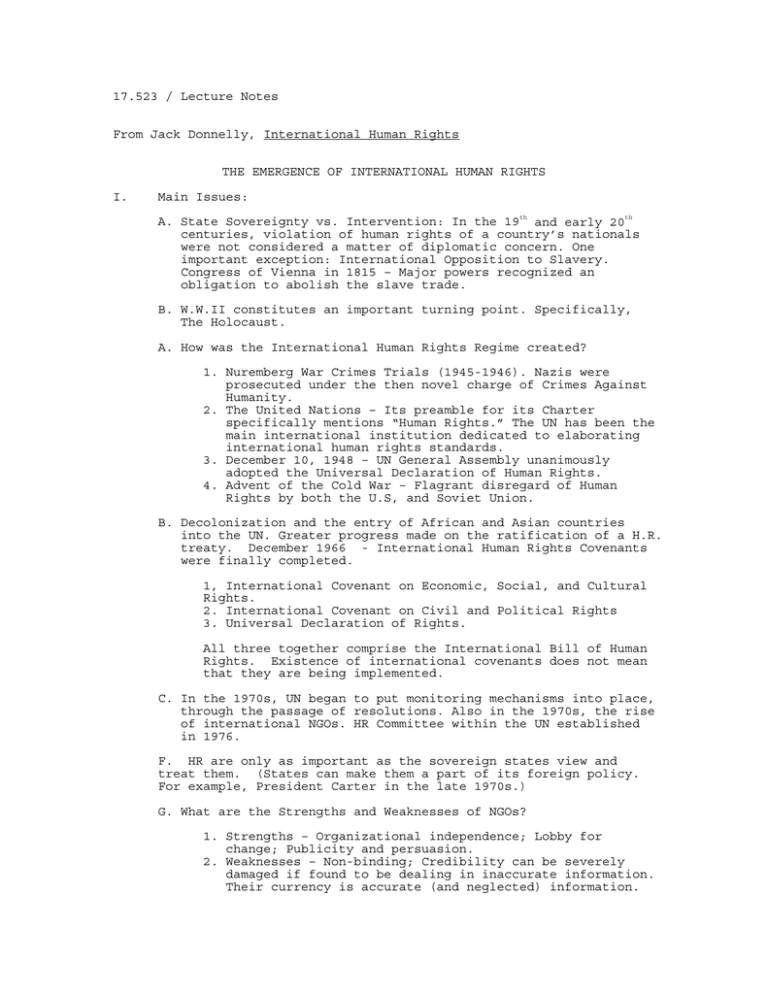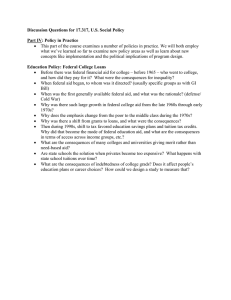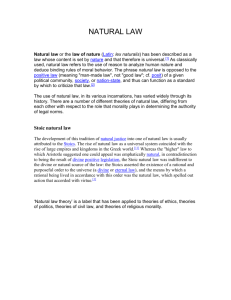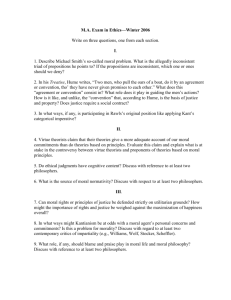17.523 / Lecture Notes From Jack Donnelly, International Human Rights
advertisement

17.523 / Lecture Notes From Jack Donnelly, International Human Rights THE EMERGENCE OF INTERNATIONAL HUMAN RIGHTS I. Main Issues: A. State Sovereignty vs. Intervention: In the 19th and early 20th centuries, violation of human rights of a country’s nationals were not considered a matter of diplomatic concern. One important exception: International Opposition to Slavery. Congress of Vienna in 1815 – Major powers recognized an obligation to abolish the slave trade. B. W.W.II constitutes an important turning point. Specifically, The Holocaust. A. How was the International Human Rights Regime created? 1. Nuremberg War Crimes Trials (1945-1946). Nazis were prosecuted under the then novel charge of Crimes Against Humanity. 2. The United Nations – Its preamble for its Charter specifically mentions “Human Rights.” The UN has been the main international institution dedicated to elaborating international human rights standards. 3. December 10, 1948 – UN General Assembly unanimously adopted the Universal Declaration of Human Rights. 4. Advent of the Cold War – Flagrant disregard of Human Rights by both the U.S, and Soviet Union. B. Decolonization and the entry of African and Asian countries into the UN. Greater progress made on the ratification of a H.R. treaty. December 1966 - International Human Rights Covenants were finally completed. 1, International Covenant on Economic, Social, and Cultural Rights. 2. International Covenant on Civil and Political Rights 3. Universal Declaration of Rights. All three together comprise the International Bill of Human Rights. Existence of international covenants does not mean that they are being implemented. C. In the 1970s, UN began to put monitoring mechanisms into place, through the passage of resolutions. Also in the 1970s, the rise of international NGOs. HR Committee within the UN established in 1976. F. HR are only as important as the sovereign states view and treat them. (States can make them a part of its foreign policy. For example, President Carter in the late 1970s.) G. What are the Strengths and Weaknesses of NGOs? 1. Strengths – Organizational independence; Lobby for change; Publicity and persuasion. 2. Weaknesses – Non-binding; Credibility can be severely damaged if found to be dealing in inaccurate information. Their currency is accurate (and neglected) information. H. 1980s and 1990s – The deepening of International HR norms and issues as legitimate concerns of states and the international community such that now Humanitarian intervention is seen as a legitimate and sometimes preferred option. (UN peace keeping forces, care for refugees.) General Timeline: The emergence of International Human Norms (1940s) --Æ Cold War and Convenants (1950 and 1960s) ------Æ Monitoring in 1970s ---Æ Further growth and Institutionalization (1980s) ------Æ Continuity and Change in the Post-Cold War Era (1990s – Present) II. Theories of Human Rights: The nature of HR – Universal rights possessed by every human being. They are equal rights in that every human being has them equally and may claim them irrespective of which country s/he lives. HR are moral rights as well in that they presume a shared notion of a “good life” and “acceptable” behavior. They typically do not include the right to murder, flat out, as a HR. Rights as entitlements – They are exercised and typically trump all competing claims. Rights holders versus duty bearers. Human rights provide a moral standard of national political legitimacy. Human Rights based on some notion of human nature. But what’s that? Most broadly, a moral account of human possibility. Marxists: Human nature is the result of historical processes and esp. class struggle. Radical Behaviorists: Human nature is the result of social conditioning. Utilitarianism – Principle of utility – Greatest happiness principle requires us to act so as to maximize the balance of pleasure over pain. Moral and political theories that stress particularity are likely to be at odds with theories of universality. Kant’s “categorical imperative:” The duty to treat people as ends, never as means only. This imperative is categorical, without exception. A list of human rights can be seen as a political specification of what it means to treat all human beings as ends. In the end, although there may appear to be a political consensus, there is no philosophical consensus about human rights.






